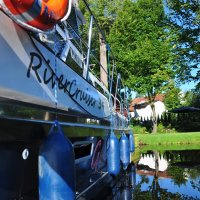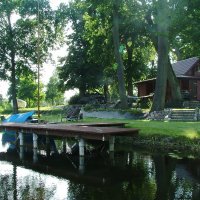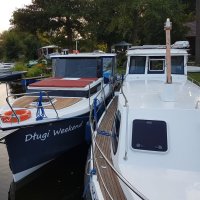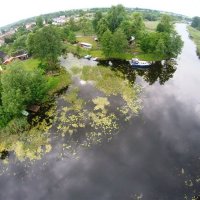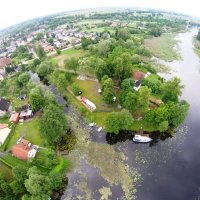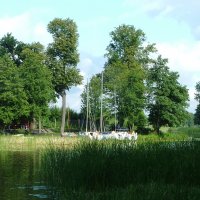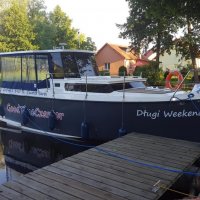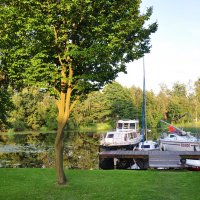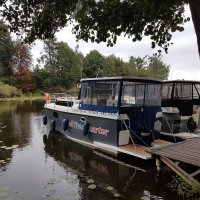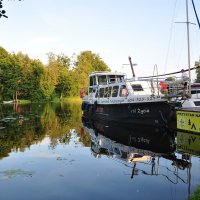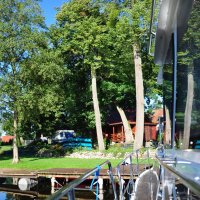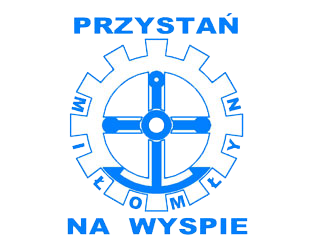The marina on the island - Miłomłyn We would like to remind you that when using the ONE WAY service, we must know about it during the booking process, we will make every effort to ensure that it can take place.
DESCRIPTION
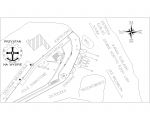 Our home port is Miłomłyn, a small town near Ostróda. This is where we start and finish Our charters.
Our home port is Miłomłyn, a small town near Ostróda. This is where we start and finish Our charters.
We chose the marina on the island not by accident. The owners, for many years, created this place, built it from almost nothing, and step by step adapting it for water sportsmen. Today, Marina is often visited not only by sailors. Thanks to the cooperation with local producers of cold meats, cheeses and other specialties, Marina offers supplying these products almost at any time, and organized bonfire is always accompanied by refreshments. From Miłomłyn it is possible to sail to Jeziorak and further to Siemiany and Iława, or choose a route through the lock and reach Drwęckie and Ostróda, and further on to Szeląg Wielki and to Stare Jabłonki. Both are fascinating and worth crossing. If we go to the north, we will pass some lakes, inclines and after about 7-8 hours of calm sailing we will reach Elbląg and further on the Żuławy Loop or the Vistula Lagoon.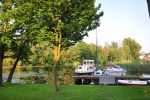 The marina on the island is a place that will gladly welcome sailors, canoeists, motorboats, cyclists and every traveler traveling along the Elbląg Canal route. It offers a boat stop at the pier, a warm shower, a place to pitch a tent and light a fire, as well as renting canoes. This place, on the one hand intimate and drowning in the green of age hornbeams, lindens and maples, is almost in the center of the town, where you can easily get everything you need during the trip.
The marina on the island is a place that will gladly welcome sailors, canoeists, motorboats, cyclists and every traveler traveling along the Elbląg Canal route. It offers a boat stop at the pier, a warm shower, a place to pitch a tent and light a fire, as well as renting canoes. This place, on the one hand intimate and drowning in the green of age hornbeams, lindens and maples, is almost in the center of the town, where you can easily get everything you need during the trip.
Facility type: Przystań jachtowa / kajakowa / Campsite
Region: Iława Lakeland
Akwen: The Elbląg Canal
Address: 14-140 Miłomłyn, ul. Market 3A
GPS: 53.766005N, 19.835351E Our second place where you can pick up or pass the yacht is Elbląg, a city quite different than Miłomłyn. Much, much bigger, crowded both on the road and on the water, although the port where we have our place is distant from the center and despite its size is quiet and peaceful. The Yacht Port is located on the west bank of the Elbląg River, a port basin on a square plan with one side slightly longer. After renovation the dock is divided into two parts by a mooring pier with Y-booms, thanks to which there are many mooring places. In the marina you will find everything a boater needs, electricity, water. Sanitary facilities and showers available 24H.
Our second place where you can pick up or pass the yacht is Elbląg, a city quite different than Miłomłyn. Much, much bigger, crowded both on the road and on the water, although the port where we have our place is distant from the center and despite its size is quiet and peaceful. The Yacht Port is located on the west bank of the Elbląg River, a port basin on a square plan with one side slightly longer. After renovation the dock is divided into two parts by a mooring pier with Y-booms, thanks to which there are many mooring places. In the marina you will find everything a boater needs, electricity, water. Sanitary facilities and showers available 24H.
Yacht Klub Wodnik - Elbląg
Facility type: Yacht Port
Water reservoir: the Elbląg River
Address: 82-310 Elbląg, ul. Radomska 29
MIŁOMŁYN
 The first mention of Miłomłyn comes from 1315. From 1323, we find notes about the priest of the Miłomłyn parish - a man named Ludwik. Miłomłyn received city rights in 1335 from the commander of the Hartwig Teutonic Order (Hartung von Sonnenborn). In October 1466, the nobleman from Miłomłyn put his seal on the document of the Toruń Treaty. In 1552, Albrecht von Finckenstein received the pledge in Miłomłyn. The last Protestant bishops of Pomezania resided in the castle of Miłomłyn. In 1414, for a short time, they occupied the city of Poles and destroyed it. In November 1520, the commissar of Ostróda along with the Teutonic commander from Iława entered cunningly into the city at night and cut down the Polish crew. In 1591, the fire caused large losses. After the next fire on 18 October 1633 only 4 houses and a church from the Teutonic era survived. The fire in 1700 destroyed buildings erected after 1633, only the church and two houses survived. The next serious fire in the early nineteenth century was another serious loss in the city's development. In January 1807, the city was taken over by the French, then by Prussians and Russians. In mid-December 1831, after the defeat of the November Insurrection, one day of retreating Polish troops from the corps of General Maciej Rybiński was stationed here.
The first mention of Miłomłyn comes from 1315. From 1323, we find notes about the priest of the Miłomłyn parish - a man named Ludwik. Miłomłyn received city rights in 1335 from the commander of the Hartwig Teutonic Order (Hartung von Sonnenborn). In October 1466, the nobleman from Miłomłyn put his seal on the document of the Toruń Treaty. In 1552, Albrecht von Finckenstein received the pledge in Miłomłyn. The last Protestant bishops of Pomezania resided in the castle of Miłomłyn. In 1414, for a short time, they occupied the city of Poles and destroyed it. In November 1520, the commissar of Ostróda along with the Teutonic commander from Iława entered cunningly into the city at night and cut down the Polish crew. In 1591, the fire caused large losses. After the next fire on 18 October 1633 only 4 houses and a church from the Teutonic era survived. The fire in 1700 destroyed buildings erected after 1633, only the church and two houses survived. The next serious fire in the early nineteenth century was another serious loss in the city's development. In January 1807, the city was taken over by the French, then by Prussians and Russians. In mid-December 1831, after the defeat of the November Insurrection, one day of retreating Polish troops from the corps of General Maciej Rybiński was stationed here.
 Miłomłyn is a city in the province Warmian-Masurian, in the Ostróda poviat, the seat of the urban-rural commune of Miłomłyn. It is located by the national road No. 7 in the western part of the Ostróda poviat. The commune is, geographically, predominantly located in the Iławskie Lake District and partly in the Chełmińsko-Dobrzyński Lake District. It is a typical land of forests and lakes. In the commune there are two nature reserves and numerous nature monuments. In the ornithological reserve "Lake Iłgi" located about 10 km west of Miłomłyn, there are numerous breeding sites for wetland birds, and in the "Drwęca River" there is an environment of species-protected fish: trout, salmon, trout and caste. In the backwoods of the forest you can see numerous deer, roe deer, wild boars, foxes and fallow deer. Nature lovers can admire the white-tailed eagles over the forest complexes, ospreys and black storks. Forests in the Miłomłyn commune are also a paradise for pickers of berries and mushroom pickers.
Miłomłyn is a city in the province Warmian-Masurian, in the Ostróda poviat, the seat of the urban-rural commune of Miłomłyn. It is located by the national road No. 7 in the western part of the Ostróda poviat. The commune is, geographically, predominantly located in the Iławskie Lake District and partly in the Chełmińsko-Dobrzyński Lake District. It is a typical land of forests and lakes. In the commune there are two nature reserves and numerous nature monuments. In the ornithological reserve "Lake Iłgi" located about 10 km west of Miłomłyn, there are numerous breeding sites for wetland birds, and in the "Drwęca River" there is an environment of species-protected fish: trout, salmon, trout and caste. In the backwoods of the forest you can see numerous deer, roe deer, wild boars, foxes and fallow deer. Nature lovers can admire the white-tailed eagles over the forest complexes, ospreys and black storks. Forests in the Miłomłyn commune are also a paradise for pickers of berries and mushroom pickers.ELBLĄG
 The beginnings of the city fall on 1237. At that time, on the banks of the Elbląg River, the Teutonic Knights founded a defensive castle. A trade settlement has grown around him. In 1246 she received the Lubeck municipal rights. In Elbląg, at that time, there was the seat of the national masters of the Teutonic Order. In the 14th century Elbląg was an important port center and belonged to the Hanseatic League. The results of excavations carried out in the Old Town prove the wealth of the old Elbląg inhabitants. Archaeologists extract thousands of amber, pottery, glass, metal, etc. They are evidence of the existence of lively commercial contacts of the inhabitants of the former Elbląg, among others with Germany, Scandinavia, England, the Netherlands. An important date in the history of the city was its accession in 1440 to the Prussian Union. After the battle of Grunwald in 1410, the elders paid homage to the Polish king Władysław Jagiełło by offering him the captured Teutonic castle. However, it was only after Toruń's peace in 1466 that Elbląg became part of the Polish state. The city has received numerous privileges from Polish kings, it has become an important seaport. The wars that swept through these areas in the 16th and 17th centuries brought plagues, plunder and contributions.
The beginnings of the city fall on 1237. At that time, on the banks of the Elbląg River, the Teutonic Knights founded a defensive castle. A trade settlement has grown around him. In 1246 she received the Lubeck municipal rights. In Elbląg, at that time, there was the seat of the national masters of the Teutonic Order. In the 14th century Elbląg was an important port center and belonged to the Hanseatic League. The results of excavations carried out in the Old Town prove the wealth of the old Elbląg inhabitants. Archaeologists extract thousands of amber, pottery, glass, metal, etc. They are evidence of the existence of lively commercial contacts of the inhabitants of the former Elbląg, among others with Germany, Scandinavia, England, the Netherlands. An important date in the history of the city was its accession in 1440 to the Prussian Union. After the battle of Grunwald in 1410, the elders paid homage to the Polish king Władysław Jagiełło by offering him the captured Teutonic castle. However, it was only after Toruń's peace in 1466 that Elbląg became part of the Polish state. The city has received numerous privileges from Polish kings, it has become an important seaport. The wars that swept through these areas in the 16th and 17th centuries brought plagues, plunder and contributions.
After the first partition of Poland in 1772, Elbląg was incorporated into the Prussian state. The revival of the city took place in the 19th century. Elbląg found itself on the railway route. The Elbląg Canal was handed over to exploitation. Established plants, including brewery, cigar factory, locomotives and cars. Of particular importance to the city, however, was the shipyard, founded by Ferdinand Schichau. In Elbląg, among others, torpedo boats, submarines and locomotives. In 1945, the city returned to Poland. As a result of hostilities, Elbląg was destroyed in about 65 percent. The Old Town suffered especially. Historic tenement houses were ruined. Other, damaged, dismantled. Most of the former Elbląg left the city. The reconstruction was taken over by the displaced people. New workplaces and housing estates have been created over the past years. Thanks to the initiative of the city authorities, in 1998, the Euroregion Baltic was established - one of the largest Euroregions in Europe, of which Elbląg is a member. Elbląg, currently 124 thousand. inhabitants, is located by the river with the same name, in the north-western part of the Warmian-Masurian Voivodeship, near the Vistula Lagoon. It is located at the route No. 7 Warsaw-Gdańsk, and at the so-called "Berlince" - the road to Kaliningrad, 60 km from Gdańsk, 50 km from the Polish-Russian border and 100 km from Kaliningrad. Elbląg is a dynamically developing city with poviat rights, an industrial, academic and cultural center, an attractive starting point for tourists. It is also a seaport. For his achievements in environmental protection he was twice honored - as the first city in Poland - with the "ecological" prize of the European Union. The Council of Europe, on the other hand, gave it the Flag of Europe. He is also a three-time winner of the nationwide competition "Environment-Friendly Commune" under the patronage of the President of the Republic of Poland Aleksander Kwaśniewski. He also received a distinction from the Union of Baltic Cities for the implementation of the ecological education program. The city is active in the international field. At the initiative of its authorities, in 1998, the Euroregion Bałtyk was established, gathering coastal regions of six countries located on the Baltic Sea: Russia, Poland, Sweden, Lithuania, Latvia and Denmark. Elbląg cooperates with 14 partner cities. These are: Kaliningrad and Bałtijsk (Russia), Leer (Germany), Ronneby (Sweden), Nowogródek (Belarus), Druskininkai (Lithuania), Ternopil (Ukraine), Liepaja (Latvia), Compiegne (France), Trowbridge (England), Coquimbo (Chile), Baoji (China), Tainan (Taiwan), Nowy Sącz (Poland).
Elbląg, currently 124 thousand. inhabitants, is located by the river with the same name, in the north-western part of the Warmian-Masurian Voivodeship, near the Vistula Lagoon. It is located at the route No. 7 Warsaw-Gdańsk, and at the so-called "Berlince" - the road to Kaliningrad, 60 km from Gdańsk, 50 km from the Polish-Russian border and 100 km from Kaliningrad. Elbląg is a dynamically developing city with poviat rights, an industrial, academic and cultural center, an attractive starting point for tourists. It is also a seaport. For his achievements in environmental protection he was twice honored - as the first city in Poland - with the "ecological" prize of the European Union. The Council of Europe, on the other hand, gave it the Flag of Europe. He is also a three-time winner of the nationwide competition "Environment-Friendly Commune" under the patronage of the President of the Republic of Poland Aleksander Kwaśniewski. He also received a distinction from the Union of Baltic Cities for the implementation of the ecological education program. The city is active in the international field. At the initiative of its authorities, in 1998, the Euroregion Bałtyk was established, gathering coastal regions of six countries located on the Baltic Sea: Russia, Poland, Sweden, Lithuania, Latvia and Denmark. Elbląg cooperates with 14 partner cities. These are: Kaliningrad and Bałtijsk (Russia), Leer (Germany), Ronneby (Sweden), Nowogródek (Belarus), Druskininkai (Lithuania), Ternopil (Ukraine), Liepaja (Latvia), Compiegne (France), Trowbridge (England), Coquimbo (Chile), Baoji (China), Tainan (Taiwan), Nowy Sącz (Poland).
The best place to start exploring the city is the boulevard of Zygmunt August, where you will find moorings. The boulevard is practically the old town, so monuments, museums and restaurants are very close.
Our haven
Partnerzy
© 2016 - 2019 GoodTimeCzarter - DaveDesign





